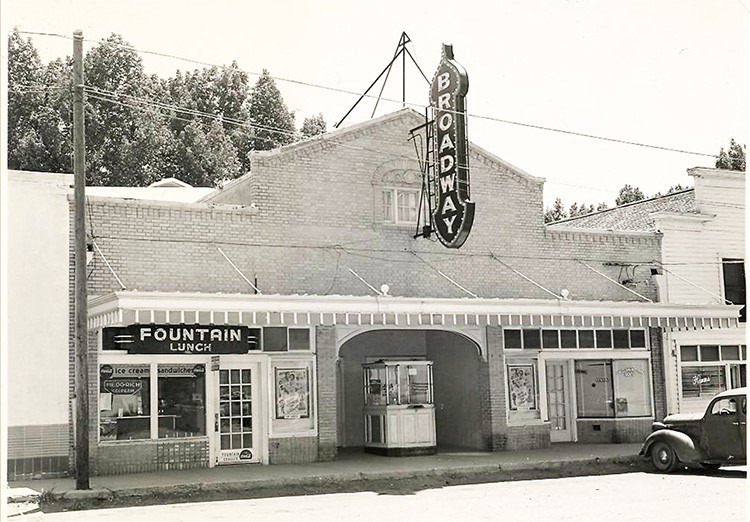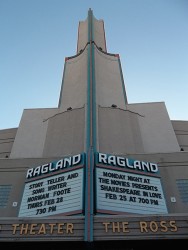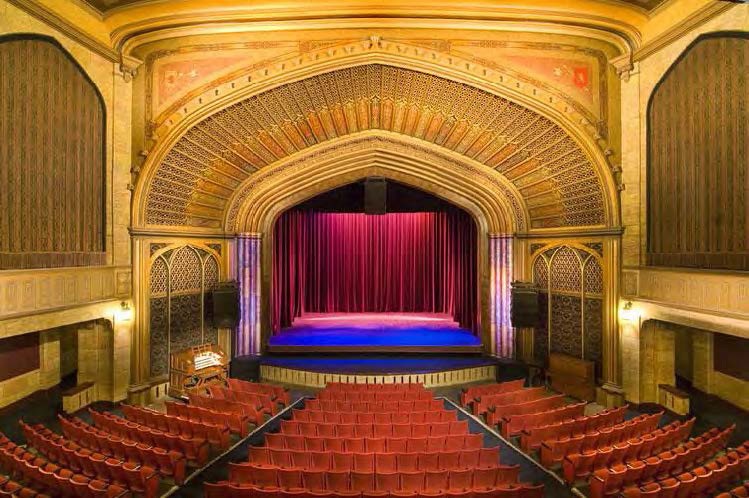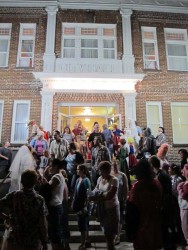A new report on the condition and needs of Oregon’s historic theaters reveals them as potentially significant economic engines as well as cultural touchstones in communities small and large. But they’re challenged by deferred maintenance and other financial and organizational needs, for which the report provides specific recommendations.
Nearly a year of research resulted in “Oregon Historic Theaters: Statewide Survey and Needs Assessment.” The report reveals that the many shuttered or struggling theaters—former cultural and economic linchpins in their communities—remain potential catalysts for downtown revitalization.
The report was produced by five University of Oregon graduate students working with UO Community Planning Workshop Program Director Robert Parker. They documented the condition and needs of the theaters and outlined recommendations for increased success.

- Broadway Theater in Malin, southeast of Klamath Falls. Image courtesy Basin Youth for Christ.
The survey identified four key challenges facing historic theaters: tight finances, aging infrastructure, increased competition, and lack of coordination among owners-operators for sharing opportunities.

- Ross Ragland Theater in Klamath Falls. Photo by Marti Gerdes.
Other findings:
· Fifty-six percent of Oregon’s historic theaters have not been seismically retrofitted, 57 percent do not have automatic fire protection, and 46 percent are not fully ADA compliant.
· The theaters collectively hosted 62,000 events and brought in $23 million in revenue.
· The thirty-six theaters responding to the survey reported a combined $20.8 million in deferred maintenance.
· Thirty-two percent had not upgraded to fully digital projection, necessary to show first-run movies and remain more competitive.
The report recommends: (1) theaters undergo comprehensive structural assessments, preferably by an architect trained in historic preservation; and (2) a diverse coalition of nonprofit and state agencies create a statewide “historic theaters initiative” that offers funding, technical support, access to diverse programming, and a mechanism for sharing information and resources.

- Elsinore Theatre in Salem, Oregon, was designed by Ellis F. Lawrence, former A&AA dean. Courtesy Elsinore Theatre.
A five-year “Action Plan” to address theaters’ needs was begun in August by Restore Oregon, Oregon Main Street, the Oregon Heritage Commission, Oregon Film (the Governor’s Office of Film and Video), Oregon Arts Commission, Oregon Regional Solutions Team, Pacific Power, and the UO’s Community Service Center.
Travel Oregon provided a matching grant for the survey. Match dollars, acquired through efforts by Parker, came from the US Economic Development Administration (EDA) administered through the UO’s EDA University Center. The inventory was conducted between September 2014 and August 2015.
The findings will be formally presented at the 2015 Oregon Main Street conference in The Dalles on October 7.
Read the report on the Oregon Historic Theaters website. View a video about the project.

In 2017 Restore Oregon plans to build upon the groundwork of the survey, leading a coalition that will develop strategic planning and preservation tools to help restore historic theaters and see them thrive as cultural and economic linchpins in their communities. There will be a half-day workshop on historic Theaters at the upcoming Oregon Main Street Conference in The Dalles on Wednesday, October 7th from 9am – noon. For registration information go to http://www.omsconference.eventbrite.com. Attendance is free, but you must register in advance.


Kudos to everyone behind saving and restoring Oregon’s old theaters. This needs to be done nation-wide!
Many old theaters had pipe organs to accompany silent movies; some destroyed and lost forever, others in homes or even still in the theaters needing major repair, such as one of the largest Wurlitzers in the state and the only one left in its original location, the Egyptian Theater in Coos Bay
And there is a dire need to encourage young people to study organ, for we organists are dying out like an endangered species.
A fine Wurlitzer that was in the Douglas theater in Eugene has been saved and well-maintained in a private home in Spokane, WA, and is up for sale or donation. It should certainly go to a theater whose organ is missing, like the Majestic in Corvallis, which used to have a Wurlitzer, so the space for the pipes and percussion should still be intact. It is unlikely that it will be welcomed back to Eugene due to lack of interest among organists there and the commercial nature of the entity now operating the theater.
Anyone who has heard a mighty pipe organ in a theater can attest to how live music can bring a theater alive like nothing else. These organs imitate a full orchestra, so they can do much more than accompany a silent movie or play entrance, intermission and exit background solos.
At the hands of a competent organist, there is no reason that a theater organ cannot accompany an entire opera, Broadway musical, Gilbert and Sullivan type light opera and even incidental music for dramas, or recreate 30’s and 40’s live radio show background. And this is not to mention sing-along programs and concerts for all major holidays, perhaps combined with school bands, choirs and soloists, for example, at a July 4th celebration, Black History Month, Memorial and Veteran’s days, etc.
“Let’s do this!” as they say.
Cordially,
Dr. Robert Thomson, organist
Corvallis, Oregon
You’re right Bob. We would love to find a great home for that organ and as we get more involved in this project, we will keep it in mind. With a littl luck, we might find a historic theater in need of a Wurlitzer.